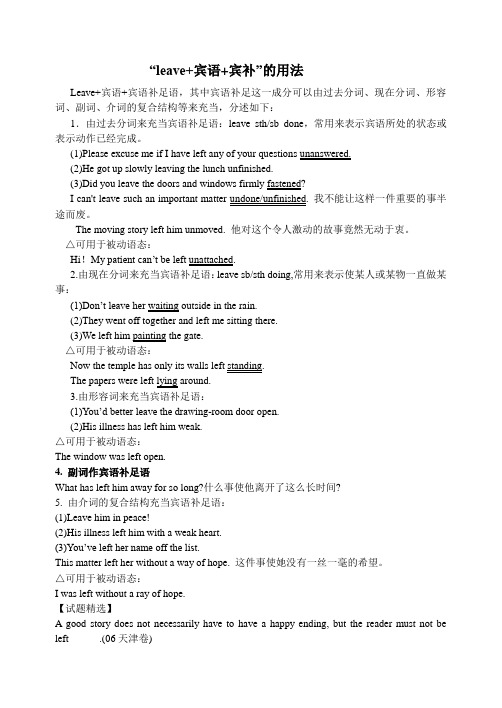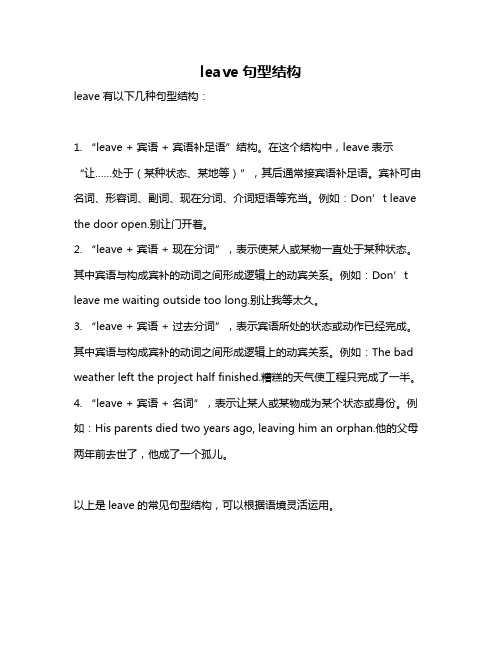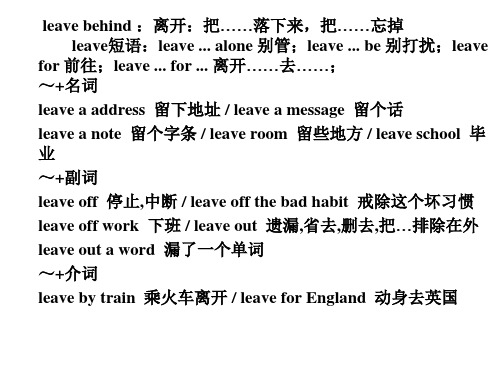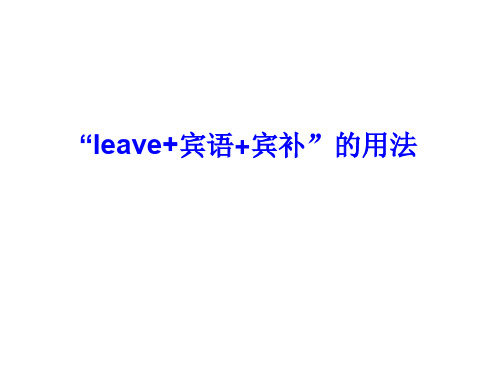leave复合结构
leave+宾语+宾补的用法

The movingstory left himunmoved.他对这个令人激动的故事竟然无动于衷。
2.由现在分词来充当宾语补足语:leave sb/sth doing,常用来表示使某人或某物一直做某事(宾语和宾补被动关系).
3.由形容词来充当宾语补足语:
(1)You’dbetter leavethe drawing-room dooropen.
(2)Hisillnesshaslefthimweak.
△可用于被动语态:
Thewindow wasleft open.
4.由副词作宾语补足语
(1)What haslefthimawayfor so long?什么事使他离开了这么长时间?
3.John rushed outin a hurry,______the door _______.
A.leaving, unlocked B. leaving, unlocking C.left,unlockedD.toleave, unlocking
4.Don’tleave the water______ whileyou brushyour teeth.
△可用于被动语态:
I wasleftwithout a ray of hope.
5.由名词作宾语补足语
The earthquakelefthim an orphan.
【试题精选】
1.Agoodstorydoes notnecessarilyhavetohaveahappyending,but thereadermust notbe left______.(06天津卷)
leave+宾语+宾补

“leave+宾语+宾补”的用法Leave+宾语+宾语补足语,其中宾语补足这一成分可以由过去分词、现在分词、形容词、副词、介词的复合结构等来充当,分述如下:1.由过去分词来充当宾语补足语:leave sth/sb done,常用来表示宾语所处的状态或表示动作已经完成。
(1)Please excuse me if I have left any of your questions unanswered.(2)He got up slowly leaving the lunch unfinished.(3)Did you leave the doors and windows firmly fastened?I can't leave such an important matter undone/unfinished. 我不能让这样一件重要的事半途而废。
The moving story left him unmoved. 他对这个令人激动的故事竟然无动于衷。
△可用于被动语态:Hi!My patient can’t be left unattached.2.由现在分词来充当宾语补足语:leave sb/sth doing,常用来表示使某人或某物一直做某事:(1)Don’t leave her waiting outside in the rain.(2)They went off together and left me sitting there.(3)We left him painting the gate.△可用于被动语态:Now the temple has only its walls left standing.The papers were left lying around.3.由形容词来充当宾语补足语:(1)You’d better leave the drawing-room door open.(2)His illness has left him weak.△可用于被动语态:The window was left open.4. 副词作宾语补足语What has left him away for so long?什么事使他离开了这么长时间?5. 由介词的复合结构充当宾语补足语:(1)Leave him in peace!(2)His illness left him with a weak heart.(3)You’ve left her name off the list.This matter left her without a way of hope. 这件事使她没有一丝一毫的希望。
leave句型结构

leave句型结构
leave有以下几种句型结构:
1. “leave + 宾语 + 宾语补足语”结构。
在这个结构中,leave表示“让……处于(某种状态、某地等)”,其后通常接宾语补足语。
宾补可由名词、形容词、副词、现在分词、介词短语等充当。
例如:Don’t leave the door open.别让门开着。
2. “leave + 宾语 + 现在分词”,表示使某人或某物一直处于某种状态。
其中宾语与构成宾补的动词之间形成逻辑上的动宾关系。
例如:Don’t leave me waiting outside too long.别让我等太久。
3. “leave + 宾语 + 过去分词”,表示宾语所处的状态或动作已经完成。
其中宾语与构成宾补的动词之间形成逻辑上的动宾关系。
例如:The bad weather left the project half finished.糟糕的天气使工程只完成了一半。
4. “leave + 宾语 + 名词”,表示让某人或某物成为某个状态或身份。
例如:His parents died two years ago, leaving him an orphan.他的父母两年前去世了,他成了一个孤儿。
以上是leave的常见句型结构,可以根据语境灵活运用。
leave宾语宾补的用法

法总结Leave+宾语+宾语补足语,其中宾语补足语这一成分可以由过去分词、现在 分词、形容词、副词、介词的复合结构等来充当,意思是”使••…处于…状态;听 任;让”现分述如下:1. 由过去分词来充当宾语补足语:leave sth/sb done ,常用来表示宾语所处 的状态或表示动作已经完成。
(宾语和宾补被动关系)(1) He got up slowly, leav ing the lunch unfini shed.(2) Did you leave the doors and win dows firmly faste ned?(3) 1 can't leave such an important matter undone/unfinished. 我不能让这样一 件重要的事半途而废。
The movi ng story left him unm oved.他对这个令人激动的故事竟然无动于 衷。
2. 由现在分词来充当宾语补足语:leave sb/sth doing,常用来表示使某人或某 物一直做某事(宾语和宾补被动关系).(1) Don ' t leave her waiting outside in the rain.(2) They went off together and left me sitti ng there.(3) We left him pain ti ng the gate.△可用于被动语态:The papers were left lying aro und.3. 由形容词来充当宾语补足语:(2)His ill ness has left him weak.△可用于被动语态:leave 宾语+xx (即leave 复合结构)的用 (1) You d better leave the drawin m door ope n.The wi ndow was left ope n.4•由副词作宾语补足语(1) What has left him away for so lo ng?什么事使他离开了这么长时间?(2) We can ' t leave the light on when leaving.5.由介词的复合结构充当宾语补足语:(1) Leave him in peace!(2) His ill ness left him with a weak heart.(3) You ' ve left her name off the list.⑷This matter left her without a way of hope.这件事使她没有一丝一毫的希望。
make, let, keep, have, get, leave, catch, find常见复合结构

make +间宾+直宾 He made us some coffee. He made some coffee for us. make+ O +V What made you change your mind? The prisoners are made to dig holes and fill them in again.
6. catch sb. doing He was caught stealing. A cook will be immediately fired if he is found ____ (smoke) in the kitchen. I was glad to see the children well ___ (take) care of. ----Come on, please give me some ideas about the project. --- Sorry. With so much work ____ my mind, I almost break down. A. filled B. filling C. to fill D. being filled
刘树凯 牛鹏飞 3组 王依婷 郝立超 周港磊
卞国昊 邵文杰 张 凯 9组 徐 飞 王文磊 满康乐 李浩东
张国锋 张志浩 韩昊霖 6组 张 甜 周思雨 韩凯栋
顾芳冰 孙煜栋 泥 涛 2组
魏中硕 陈雨嵩 王企瑞 高子涵 8组
王昆明 韩 程 张 佳 5组
高朋丽 李成龙 王乐泽
王义豪 孙祥雨 李海云 李梦坤
5. find + O + adj. / doing/ done/ 介词短语 find + it + adj. + to do I found the job boring. I found the door closed. We found him waiting for us at the station. The day I got back, I found a note on my desk. When he came to, he found himself surrounded by enemies. Some children find it difficult to concentrate. Richard was disappointed to find his suggestions _____ A. being turned down B. turned down C. to be turned down D. to turn down
(完整版)leave+宾语+宾补的用法

“leave+宾语+宾补”(即leave复合结构)的用法总结Leave+宾语+宾语补足语,其中宾语补足语这一成分可以由过去分词、现在分词、形容词、副词、介词的复合结构等来充当,意思是”使.....处于…..状态;听任;让”现分述如下:1.由过去分词来充当宾语补足语:leave sth/sb done,常用来表示宾语所处的状态或表示动作已经完成。
(宾语和宾补被动关系)(1)He got up slowly, leaving the lunch unfinished.(2)Did you leave the doors and windows firmly fastened?(3)I can't leave such an important matter undone/unfinished. 我不能让这样一件重要的事半途而废。
The moving story left him unmoved. 他对这个令人激动的故事竟然无动于衷。
2.由现在分词来充当宾语补足语:leave sb/sth doing,常用来表示使某人或某物一直做某事(宾语和宾补被动关系).(1)Don’t leave her waiting outside in the rain.(2)They went off together and left me sitting there.(3)We left him painting the gate.△可用于被动语态:The papers were left lying around.3.由形容词来充当宾语补足语:(1)You’d better leav e the drawing-room door open.(2)His illness has left him weak.△可用于被动语态:The window was left open.4.由副词作宾语补足语(1)What has left him away for so long?什么事使他离开了这么长时间?(2)We can’t leave the light on when leaving.5. 由介词的复合结构充当宾语补足语:(1)Leave him in peace!(2)His illness left him with a weak heart.(3)You’ve left her name off the list.(4)This matter left her without a way of hope. 这件事使她没有一丝一毫的希望。
leave-复合宾语

【试题精选】 A good story does not necessarily have to have a happy ending, but the reader must not be left______.(06天津卷) A.unsatisfied B.unsatisfying C.to be unsatisfying D.being unsatisfied 答案:A 2. His remarks left me ______ about his real purpose A.wondered B. wonder C. to wonder D. wondering 3. John rushed out in a hurry, ______ the door _______. A.leaving, unlocked B. leaving, unlocking C. left, unlocked D. to leave, unlocking
“leave+宾语+宾补”的用法
leave + Sb / Sth. + doing / done/ to do / adj / adv /prep
Leave+宾语+宾语补足语, 其中宾语补足这一成分可以由 过去分词、现在分词、形容词、 副词、介词的复合结构等来充当, 分述如下:
1.由过去分词来充当宾语补足语:leave sth/sb done, 常用来表示宾语所处的状态或表示动作已经完成。
3.由形容词来充当宾语补足语: (1)You’d better leave the drawing-room door open. (2)His illness has left him weak.
△可用于被动语态: The window was left open.
leave的四种用法

leave的四种用法一、leave作为动词的基本用法1.1 leave的基本含义Leave作为动词,最基本的含义是“离开”,指某人或物从某个地方或状态中出去或脱离。
例如:- She left the room.(她离开了房间。
)- The train leaves at 10:30.(火车在10:30离开。
)1.2 leave与介词连用的用法Leave还可以与介词连用,构成一些固定短语,表示特定的意义。
常见的有:- leave for:动身去某处- leave behind:留下- leave out:省略- leave off:停止例如:- We are leaving for Beijing tomorrow morning.(我们明天早上出发去北京。
)- He always leaves his homework behind.(他总是把作业落在家里。
)- Don't leave out any details in your report.(你的报告中不要漏掉任何细节。
)- The children left off playing when it started to rain.(下雨开始时孩子们停止玩耍。
)二、leave作为名词的用法2.1 leave作为名词的含义Leave还可以作为名词使用,表示“休假”、“假期”等意义。
例如:- I'm going to take a week's leave next month.(我下个月要请一个星期假。
)- He has been on sick leave for two weeks.(他已经病假两周了。
)2.2 leave作为名词的用法Leave作为名词还可以与其他单词组合成一些固定短语,表示特定的意义。
常见的有:- annual leave:年假- maternity leave:产假- paternity leave:陪产假- sick leave:病假例如:- I have 20 days of annual leave every year.(我每年有20天的年假。
- 1、下载文档前请自行甄别文档内容的完整性,平台不提供额外的编辑、内容补充、找答案等附加服务。
- 2、"仅部分预览"的文档,不可在线预览部分如存在完整性等问题,可反馈申请退款(可完整预览的文档不适用该条件!)。
- 3、如文档侵犯您的权益,请联系客服反馈,我们会尽快为您处理(人工客服工作时间:9:00-18:30)。
leave + 宾语 + 宾补 宾补:n./adj./ adv./介词短语/小三(done, doing, to do)
意思:“使.....处于…..状态;听任;让”
6. leave sth/sb 介词短语,让....处于...状态 eg. 让他静静地待着吧。 Leave him in peace. 7. leave sth/sb n.(名词),给....留下... eg.她老公给她留下一大笔钱。 Her husband left her a large amount of money.
目录
小试牛刀
leave + 宾语 + 宾补 宾补:n./adj./ adv./介词短语/小三(done, doing, to do)
意思:“使.....处于…..状态;听任;让”
1. I can't leave such an important matter undone (do). 2. My parents went out to see a film, leaving (leave) me
C. being run
D. to run
THANK YOU
leave + 宾语 + 宾补 宾补:n./adj./ adv./介词短语/小三(done, doing, to do)
意思:“使.....处于…..状态;听任;让”
4. leave sth/sb adj,让....处于...状态 eg. 让窗户开着吧。 The window was left open. 5. leave sth/sb adv,让....处于...状态 eg.我们不能人走灯不灭。 We can’t leave the light on when leaving.
f
staying (stay) at home.
3. The paper was left lying (lie) on the floor. 4. His illness left him with a weak heart (弱小的心灵). 5. What has left him away (离开) for so long? 6. His illness has left him weak (虚弱的).
1. A good story does not necessarily have to have a happy
ending, but the reader must not be left ______.
(06天津卷)
A. unsatisfied
B. unsatisfying
C. to be unsatisfying
leave + 宾语 + 宾补ቤተ መጻሕፍቲ ባይዱ宾补:n./adj./ adv./介词短语/小三(done, doing, to do)
意思:“使.....处于…..状态;听任;让”
3. leave sth/sb to do,常用来表示让...去做某事。(宾补不定式表将来/目的) He left me to do (do) what he told but I refused his order.
leave+宾语+宾补 复合结构
Shining
leave + 宾语 + 宾补 宾补:n./adj./ adv./介词短语/小三(done, doing, to do)
意思:“使.....处于…..状态;听任;让”
1. leave sth/sb done,常用来表示宾语所处的状态或表示 动作已经完成。(宾语和宾补被动关系) He got up slowly, leaving the lunch unfinished.(finish) 2. leave sb/sth doing,常用来表示使某人或某物一直做某 事(宾语和宾补主动关系) Don’t leave her waiting (wait) outside in the rain.
D. being unsatisfied
2. His remarks left me ______ about his real purpose. A. wondered B. wonder C. to wonder D. wondering
3. John rushed out in a hurry, ______ the door _______.
A. leaving, unlocked
B. leaving, unlocking
C. left, unlocked
D. to leave, unlocking
4. Don’t leave the water ______ while you brush your teeth.
A. running
B. run
